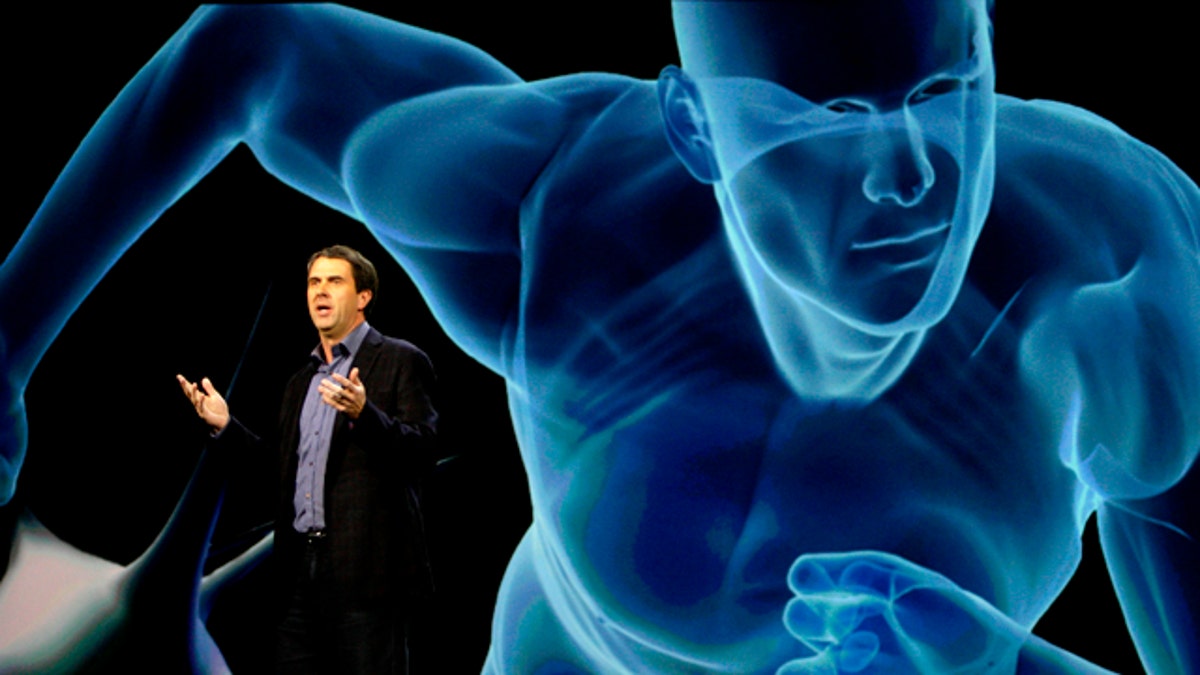
Microsoft Entertainment and Devices Division president Robbie Bach speaks during CEO Steve Ballmer's keynote address at the 2010 International Consumer Electronics Show (CES) in Las Vegas. (AP Photo/Laura Rauch)
In Las Vegas this week, it's gadgets, gizmos and goodies -- oh my!
The International Consumer Electronics Show (CES), which begins this Thursday in Las Vegas, has a checkered 40-plus-year history when it comes to introducing new products to the public. And this week, when more than 130,000 attendees descend on the show, will be no exception.
CES has witnessed the debut of the VCR (1970) and the CD (1981) as well as the DVD (1996) and HDTV (1998). On the other hand, it also touted the birth of the Laserdisc (1974) and the Mini Disc (1993) -- remember those? One should take the launch of every revolutionary, lifestyle-changing product with a grain of salt.
That said, this promises to be among the most active CES shows in the last 10 years. There will be more new mobile devices -- ones that really work and that people really want -- and improved electronics, including in-car systems that drivers seem to enjoy. It's reminiscent of the last recession, when the desktop computer almost singlehandedly galvanized businesses.
In that spirit, here's my preview of what will transpire in nerdland, er, Las Vegas this week:
Broadband on the Phone
There's been a lot of noise about bringing the kind of Internet access speeds experienced on cable and DSL to wireless smartphones. So far, only Sprint and T-Mobile have made progress in this area. However, Verizon Wireless is poised to make a big splash at CES. While some are hoping for an announcement of an iPhone on Verizon, which would free fans from the yoke of AT&T, Verizon will focus on Apple's nemesis in the cell phone race: Google's Android.
Expect to learn about several new Android handsets that use Verizon's 4G high-speed LTE network at CES. Smartphone makers like Motorola and HTC have been chomping at the bit to get these phones to market, so look for a bevy of new models that should appeal to consumers. Let's just hope Verizon doesn't also announce an onerous pricing plan to use the faster network.
Tablet Wars
The pink elephant in the room -- that is, the elephant that won't be at CES but the one everyone will be talking about -- is Apple and its audaciously successful iPad. While the company is poised to introduce a new model in just a few weeks (barring some manufacturing hiccup), the likes of Microsoft, Blackberry's RIM, Hewlett-Packard, and Google are gunning for them.
A raft of consumer electronics companies, ranging from HDTV leader Vizio to Japanese heavyweight Toshiba to Palm OS owner HP, will introduce their own tablets. These will be in a variety of sizes and price ranges, in the hopes that the right balance will be struck to unseat Apple in the tablet space. My take: Good luck. While some smaller devices along the lines of Samsung's Galaxy Tab will be successful, they won't threaten Apple's market lead.
3D Is Dead
CES is still first and foremost about television. Last year, the buzz was about 3D TVs, but so far they've failed to catch the public's attention. The main reason is that the 3D movie experience doesn't translate well from the theater to the living room. Compounding the problem, those darn goggles are awkward and expensive and there's hardly any 3D programming to watch. So it's easy to understand why it's been a failure.
Most of the television makers have given up the 3D talk (or at least relegated it to the bottom of their features lists). There will be some demonstrations of sets that work with so-called passive 3D technology -- which means the disposable glasses will do, rather than expensive active ones. Also on tap, smaller sets that don't require glasses. However, neither tech is as good as the expensive goggles, so I don't expect it to garner much interest.
TVs Finally Connect
Rather than focusing on 3D, TV makers will focus on what viewers really want: more content. Namely, more videos and shows from the Internet, paramount among which is Netflix. Nearly every set will offer some form of Web connection, whether it be to order rental movies on Wal-Mart's Vudu, stream titles from Netflix or buy digital programs from Amazon. Also included, services like custom music site Pandora and social-networking sites like Facebook and Twitter.
This trend has really been apparent in the last 12 months, but over the next year it will go completely mainstream. And while much has been made about Google's nerdy Google TV, look for some major changes there that will alter the way viewers interact with their sets.
Dark Horses
Two areas that haven't garnered as much attention in the consumer electronics space are mobile TV services and in-car services. While it's been largely ignored due to some early failures, mobile television broadcasts that can be received on a mobile phone could become a more widespread phenomena this year.
On the automotive front, it will become common this year for cars to be connected to smart phones and the Web in order to deliver options such as Internet radio and Pandora. Audi, Ford, Mercedes-Benz, and OnStar will be among the auto companies pushing such new tech while navigation companies will be heralding their smart phone apps.
2011 CES: The Year of the Tablet








































